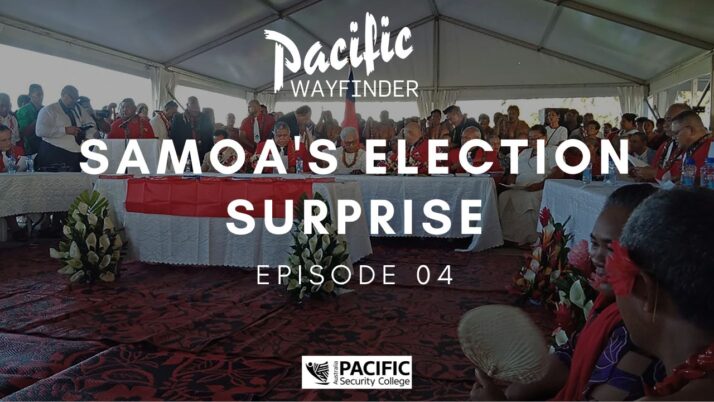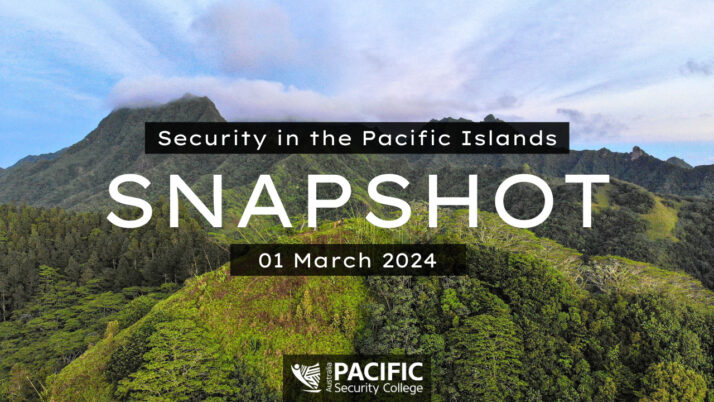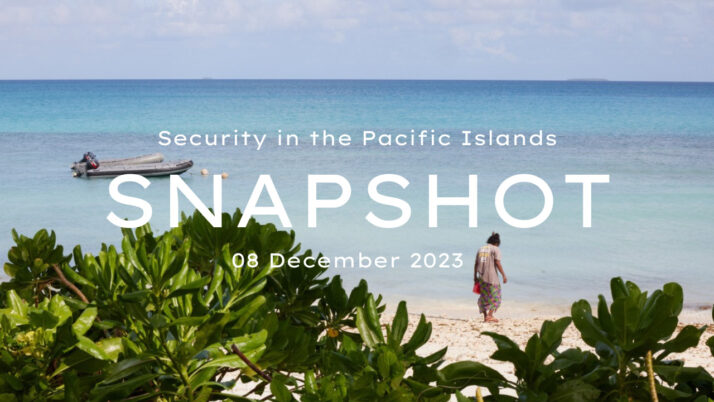Pacific Wayfinder: Samoa’s election surprise

As Samoa’s electoral crisis continues to evolve, observers should consider the broader context of this year’s election, Eliorah Malifa writes in our new Pacific Wayfinder series.
Samoa has traditionally been one of the most stable countries in the Pacific. In the region, it is known for secure and constant government.
Since independence in 1962, Samoa has been more of a ‘guided’ democracy based on its fa’amatai system, rather than an open democracy as practiced elsewhere in the region. Until 1991, only matai (chiefs) could vote. Even today, only matai can become members of parliament (MPs), so Samoa’s democracy remains limited.
Following the country’s 9 April election, Samoa’s parliament was deadlocked at 25 seats to both Faatuatua i Le Atua Samoa ua Tasi (FAST) and the Human Rights Protection Party (HRPP). This number grew to 26 apiece when the election’s one independent MP swung to FAST and Head of State Tuimalealiigano Vaaletoa Sualauvi II allowed HRPP another female MP, citing the country’s gender quota laws.
Samoa’s hung parliament prompted a constitutional crisis, and the controversial call for another election by the head of state. This was all undone with the supreme court overruling the declaration and judging the appointment of the sixth female MP under the gender quota to be unconstitutional.
Despite this ruling, FAST party members found themselves locked out of the Samoan Parliament on Monday when they arrived to begin the hand-over process. As a result, the FAST government was sworn in on the lawn of parliament without the head of state present. Malielegaoi called the swearing in illegitimate.
This whole crisis began last year, on the back of dissent within the HRPP, primarily around three key bills that were introduced by caretaker Prime Minister (PM) Tuila’epa Aiono Sailele Malielegaoi. Key party members left HRPP to form the FAST Party, which has effectively given the government it’s most serious opposition since 1982.
Recently Saui’a Louise Matai’a Milo, Dr Roannie Ng Shiu and Salā Dr George Carter provided Samoan perspectives on the 2021 Samoan election on the Pacific Security College’s Pacific Wayfinder podcast, including on the influence of transnational communities as a potential disrupter of the status quo in Samoan domestic politics, and the implications of any political instability in Samoa on the wider Pacific.
Saui’a Louise Matai’a Milo suggested that this election could represent a turning point in Samoa’s political system:
“[In] 1982 everyone was for HRPP because they brought something new. And they brought human rights as the leveler and that was the turning point of politics then. [Now] you have another party who has brought something new.”
In addition to shifting political party dynamics, another issue that may have played a role in this election are border closures as a result of the COVID-19 pandemic. Many Samoans have not been able to take regular flights from anywhere but New Zealand since March 2020, which could have influenced voter turnout, according to Dr Ng Shiu.
“From the last election, the party vote for [HRPP] is actually quite similar between 2021 and 2016 based on the preliminary data that we have from the OEC. So I’m not too sure how valid the argument is about party politics being vastly different where everyone now supports FAST,” she said.
“I think it will be interesting to see what the final voter turnout percentages are. At the moment it sits around about 60-62 per cent. In the last elections it was 72 per cent.”
But despite many Samoans being stuck overseas, Salā Dr George Carter said they may still have had an influence on the election through family networks,
“The families are choosing their votes based on their family member who’s running. They’re choosing the political parties on who their family members are running for. They’re choosing the policies based on where they belong. The conversation has become broader, it’s not just in the village,” he said.
Dr Carter also reflected on how social media and Samoa’s international diaspora have adapted, changing the way people communicate.
“Last year I saw our family funerals are now all on Zoom or now all on Facebook Messenger. We are now seeing all our weddings are on Messenger. People are watching in, communicating. And it’s not just a TV show.”
This move to digital platforms may be changing how people engage with politics as well. Now all age groups are able to hear, talk, listen, and have an interest in political matters that were usually left in the domains of adults, matai, and other leaders.
What comes next for Samoa is still unclear, with HRPP leader refusing to concede despite his counterpart being sworn in. While the uncertainty continues, the Samoan community at home and abroad are discussing how these groundbreaking changes will affect Samoan society and culture. One thing agreed on by all is that a peaceful outcome is not only in Samoa’s interests, but the interests of the whole region.
Eliorah Malifa
This article is from our new Pacific Wayfinder series, bringing you voices from the Pacific Island region. It is produced in conjunction with the Pacific Wayfinder podcast, produced by the Pacific Security College.
More Stories

Security Snapshot - 1 Mar 2024
Pacific Security Snapshot | 01 March 2024
The security stories shaping the region ➣ Pacific Islands Leaders Meeting (PALM) to be held in Tokyo in July 2024 ➣ 2023 warmest year on record, globally ➣ Elections across the Pacific prompting changes to diplomatic relations and security arrangements ➣ Extractive industries booming ➣ Environmental conservation efforts ongoing ➣ PNG riots shed light on…

Security Snapshot - 11 Dec 2023
Pacific Security Snapshot | 08 December 2023
The security stories shaping the region Outcomes from 52nd Pacific Islands Forum Leaders’ Meeting in Cook Islands 12th General Assembly of the Pacific Conference of Churches Australia-Tuvalu Falepili Union signed Pacific climate change advocacy at COP28 EU-ACP Samoa Agreement signed Solomon Islands hosts 2023 Pacific Games First PNG woman for peacekeeping duties Regionalism The Fifty-Second…






